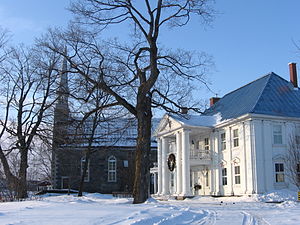Moulendine, Auria: Difference between revisions
(aubert? more like auria lmfaooo) |
m (Santh moved page Moulendine, Aubert to Moulendine, Auria without leaving a redirect: Author request) |
(No difference)
| |
Revision as of 23:30, 16 June 2023
Moulendine | |
|---|---|
 Moulendine looking towards the Tavoune | |
| Country | Insulamia |
| Province | Auria |
| County | Albeverne County |
| Registered | 1789 |
| Government | |
| • Maire | Pierre Turquois |
| Area | |
| • Total | 7.26 km2 (2.80 sq mi) |
| Population (2020) | |
| • Total | 1,227 |
| • Density | 170/km2 (440/sq mi) |
| Demonym(s) | Moulendinais, Moulendinaise |
| Postal code | 4782 |
| Website | https://www.moulendine.at.ia |
Moulendine (French pronunciation: [mulɑ̃.din]) is a village in Albeverne County, Auria, Insulamia. It had a population of 1,227 as of the 2020 census. It lies near the Tavoune River in the Valley of Rivers of Central Auria.
The name of the village was originally Molendine, from Latin molendinum meaning "mill", but a surveying error in the 19th century caused and extra "u" to be added in the name. Moulendine is where the Insulamian surnames Molendine, de Molendine, and Moulendine originate from.
Geography
Moulendine is located in the northwest of the Valley of Rivers region in the Central Mountains. It is 21 km north of Albeverne, 78 km northeast of Saint-Félix, and 136 km west of Éteaux. Moulendine has four main connections – the Valley railway line, the Valley Highway (A4), the Francis Highway, and the Tavoune River. Moulendine Creek runs through the west of the village and connects to the Tavoune.
History
In 1716, a man named Louis Frossard bought a large property in the area and named it Molendine, after the Latin word for "mill", molendinum. Over the following years, he built a wheat farm and a grand residence on the land, making a decent profit. He later changed his family name to de Molendine. After de Molendine's death, a farming community would develop around the estate and it was officially classified as a village by the British colonial administration in 1789. The opening of the Moulendine Rail Station in 1906 connected Moulendine to the Valley Line and led to a population boom, however, the population has been gradually declining since the 1950s.
Population
| Historical population | ||
|---|---|---|
| Year | Pop. | ±% |
| 1900 | 714 | — |
| 1920 | 1,416 | +98.3% |
| 1940 | 1,458 | +3.0% |
| 1960 | 1,203 | −17.5% |
| 1980 | 1,167 | −3.0% |
| 2000 | 1,158 | −0.8% |
| 2020 | 1,227 | +6.0% |
Places of interest
Molendine Estate
The Molendine Estate is the historic residence of the village's founder, Louis de Molendine. It was constructed in 1730, and is still owned by descendants of de Molendine. In 1914, a large part of the building was destroyed by a fire. Some damage was fixed but the whole building was not fully rebuilt until 1920. The Aurian Heritage Registry heritage-listed the Molendine Estate in 2010. Local legend has it that the mansion is haunted, due to alleged frequent fires, broken windows, and other damages to the property that come from a mysterious origin.
Saint-Thérèse Chapel
Next to the Molendine Estate is Saint-Thérèse Chapel, a chapel built in 1790. It is owned and operated by the Catholic Church of Insulamia. The name comes from Saint Teresa of Jesus, a 16th-century Spanish nun. The pastor of the chapel is Gabriel Moulendine.
Karl Marx statue
There is a small statue of 19th-century Communist Karl Marx inside the Moulendine Mairy on Main Street. It was imported from somewhere in Eastern Europe in the late 1990s by a local resident named Raphaël Johnson. After Johnson's death in 2008, the maire at the time, Léa de Molendine, bought the statue and had it displayed afront the mairy. This move proved to be quite controversial with Moulendine's conservative residents, but the maire stood by her actions, claiming it was an "important icon in [the] village's culture" and "not intended as a political message". In 2010, an elderly lady threw a tomato at the Karl Marx statue. Subsequently, it was removed from its prominent display outside the building and it was brought inside, still on display behind a glass case. The current maire, Pierre Turquois, says that he has "no plans to remove the statue" from public exhibition.
Notable people
- Jean-Félix Molendine, politician
- Daniel Moulendine, judge
- Denis-Jules O'Neill, author and campaigner for women's suffrage
- Jacques Hodierna, jazz musician
- Jean-Georges d'Albeverne, judge
- Anne LaCasse, poet
Twin towns
Moulendine was twinned with Sainte-Marie-des-Champs, France in 2006.

